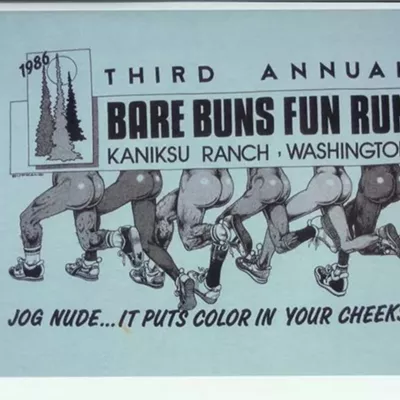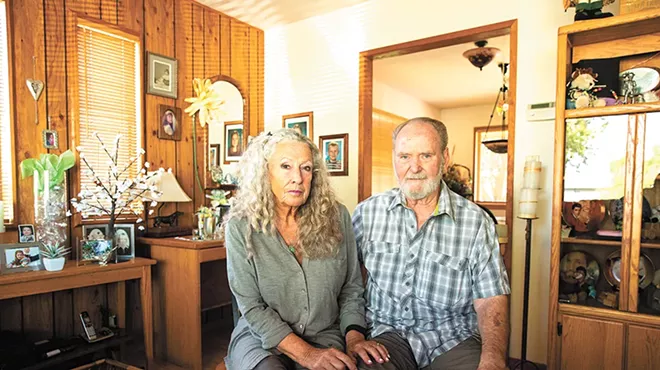Friday, July 28, 2017
The contradictory and confusing process that is civil asset forfeiture in Sunnyside, Washington

This case was about more than just money — in this case, $6,000 in cash seized four years ago by police in Sunnyside, Washington. The cops also seized Andres Gonzalez's silver 2001 BMW — illegally, as it turned out.
For the past four years, the government has dangled a silver 2001 BMW in front of Andres Gonzalez's face through the controversial law enforcement practice known as civil forfeiture. The case will end up costing the city more money than it would have gained had the court upheld the forfeiture decision, Gonzalez's attorneys say.
First, the city of Sunnyside, Washington, took the car and almost $6,000 in cash after deciding it was somehow connected to illegal drug sales or manufacturing.
Gonzalez appealed that decision to Yakima County Superior Court, where the judge concluded, "I don't think that a reasonable person could find that the money and the vehicle were involved somehow in narcotic trafficking, based upon the record we have."
The city then appealed that decision to the Washington state Court of Appeals, which upheld the city's original decision, based on a procedural technicality.
"Appellate courts — including superior courts sitting in an appellate capacity — do not reweigh evidence," the Court of Appeals concluded. Therefore "the Superior Court erred when it reweighed the evidence."
With the final word last month, the Washington state Supreme Court has given his car and his cash back to Gonzalez, along with awarding him attorneys' fees. Justice Mary Yu also had a few words to stay regarding the controversial practice that allows governments to take people's possessions — in some cases, without a single charge filed.
In 2013, Gonzalez was pulled over for speeding. His license was suspended, and Sgt. Scott Bailey placed him under arrest. A second officer showed up "to assist with impounding the car," according to court documents, and a drug-sniffing dog came with him.
The dog found a "user amount" of cocaine as well as the cash.
The city of Sunnyside seized the cash and car, and in 2014, a municipal court judge determined that the city could keep it all, based on the facts that Gonzalez had two cellphones, the "user amount" of cocaine, the large amount of cash, and the car was not registered to him when he was pulled over.
"The takeaway for me is that the city never had a coherent legal theory," says Douglas K. Garrison, one of the attorneys who worked on the forfeiture case. "I think the [Supreme Court] justices grabbed onto that pretty quickly. The opinion, in my view, indicates they did not like what the city of Sunnyside was trying to do."
Under Washington state's civil forfeiture law, the government is allowed to keep a person's property if it can be linked to the sale or manufacture of drugs. The "user amount" of coke in this case doesn't count, the court ruled.
In writing the decision, Justice Yu determined that the Sunnyside judge erroneously described the cash as being "coated" with cocaine, when in fact, no one testified to that. An officer only said he assumed there was "some" amount of drugs on the money.
"While this may seem like a small distinction, the hearing examiner's choice of the word 'coated' is significant when taken in the context of this preliminary finding as a whole," Yu writes. "The finding is not simply that the canine alerted to the money or that one could reasonably infer that the canine alerted to the money because there was some controlled substance on it. Rather, the finding indicates that the hearing examiner believed that the amount of controlled substances on Gonzalez's money was significantly greater than one would find on money that had not been used in a drug transaction. There was no evidence presented to support such a finding."
Further, Yu writes that appeals courts must take seriously their duty to ensure any asset forfeiture is supported by "substantial evidence so as not to deprive people of significant property rights except as authorized by law."
"This is particularly important in the forfeiture context because an individual may lose valuable property even when no drug crime has actually been committed, and because the government has a strong financial incentive to seek forfeiture because the seizing law enforcement agency is entitled to keep or sell most forfeited property."
The Supreme Court opinion was filed June 29. But the city only returned Gonzalez's cash and car this week, Garrison says.
"We think justice was served in this case," he says. "It took quite a while to right the wrong, but it's over and done with now."
Tags: civil forfeiture , Andres Gonzalez , Sunnyside , Washington State Supreme Court , Justice Mary Yu , News , Image


















